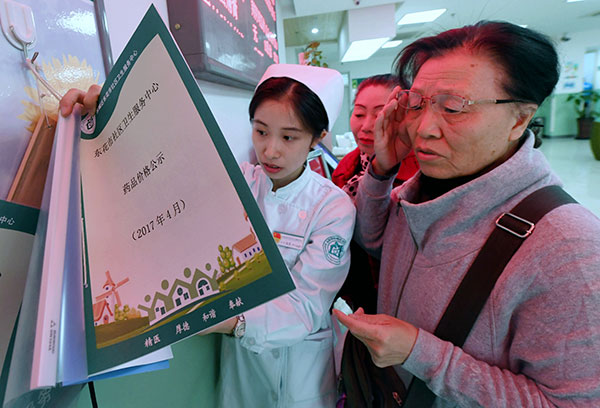Beijing patients to pay less for drugs, more for doctors
 0 Comment(s)
0 Comment(s) Print
Print E-mail China Daily, April 10, 2017
E-mail China Daily, April 10, 2017
 |
|
Residents inquire about medicine prices at a community hospital in Donghuashi, Beijing, on Saturday. [Photo/China Daily] |
Patients in Beijing will spend less on drugs but pay more to see doctors, with the total expense expected to be about the same after the city government on Saturday stopped public hospitals from profiting from medicine sales.
The reform, announced last month, replaced a registration fee and a treatment fee with a higher medical service charge. Meanwhile, it scrapped the previous markup on drugs, which could be as high as 15 percent, in the old pricing system.
Beginning Saturday morning, 2,605 Beijing hospitals switched to the new system, as released by the Beijing health authority.
One father, surnamed Zhang, said at Beijing Children's Hospital that he paid 10 yuan ($1.45) to see a doctor, five times the fee he used to pay out of his own pocket. "But it was not a big deal," he said. "We are quite happy that medication will be cheaper."
The landmark reform removed drug sales as a major source of income for public hospitals. Before the change, public hospitals in China mainly relied on three sources of income-treating patients, selling drugs and applying for government subsidies.
Official calculations show the overall medical costs for Beijing residents will remain flat, said Fang Laiying, head of the Beijing City Health and Family Planning Commission.
"Separating treatment and drug sales will stop over-prescription and help medical practitioners provide better treatment," said Fang.
A website created by the city includes all information related to medicine costs. People can see names of suppliers, what original prices are being offered, where the drugs are produced, how the drugs function, as well as other details that were not accessible before. Public hospitals are required to sell the drugs at the same price they buy them. That website is http://210.73.89.76/.
More than 3,600 medical institutions citywide are making the change, while some 1,000 small village clinics are not yet equipped with computerized billing system, according to Gao Xiaojun, spokesperson with Beijing City Health and Family Planning Commission.
Gao said total costs for buying drugs are estimated to go down by roughly 20 percent.
To offset that loss in profits to the hospitals, the government encouraged an increase in the price for medical service involving an experienced physician, expertise or staff time. Immediate price jumps can be seen in surgeries, acupuncture and nursing.
For instance, to see a chief physician who has three decades of experience in the field, a patient needed to pay 14 yuan for a diagnosis. Now, the cost is 100 yuan, or 60 yuan if the patient has a public medical insurance.
On the other hand, costs involving medical equipment have gone down. For example, positron emission tomography with computerized tomography, a PET/CT scan, used to cost 10,000 yuan. Now it costs 7,000 yuan. The cost for magnetic resonance imaging, or an MRI, went from 850 yuan to 450-600 yuan, the city government says.






Go to Forum >>0 Comment(s)